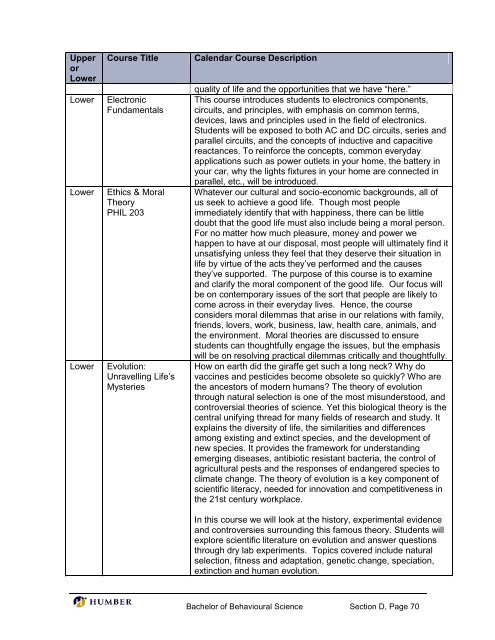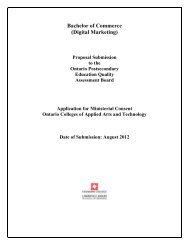Bachelor of Behavioural Science - Postsecondary Education Quality ...
Bachelor of Behavioural Science - Postsecondary Education Quality ...
Bachelor of Behavioural Science - Postsecondary Education Quality ...
Create successful ePaper yourself
Turn your PDF publications into a flip-book with our unique Google optimized e-Paper software.
Upper<br />
or<br />
Lower<br />
Lower<br />
Lower<br />
Lower<br />
Course Title<br />
Electronic<br />
Fundamentals<br />
Ethics & Moral<br />
Theory<br />
PHIL 203<br />
Evolution:<br />
Unravelling Life‘s<br />
Mysteries<br />
Calendar Course Description<br />
quality <strong>of</strong> life and the opportunities that we have ―here.‖<br />
This course introduces students to electronics components,<br />
circuits, and principles, with emphasis on common terms,<br />
devices, laws and principles used in the field <strong>of</strong> electronics.<br />
Students will be exposed to both AC and DC circuits, series and<br />
parallel circuits, and the concepts <strong>of</strong> inductive and capacitive<br />
reactances. To reinforce the concepts, common everyday<br />
applications such as power outlets in your home, the battery in<br />
your car, why the lights fixtures in your home are connected in<br />
parallel, etc., will be introduced.<br />
Whatever our cultural and socio-economic backgrounds, all <strong>of</strong><br />
us seek to achieve a good life. Though most people<br />
immediately identify that with happiness, there can be little<br />
doubt that the good life must also include being a moral person.<br />
For no matter how much pleasure, money and power we<br />
happen to have at our disposal, most people will ultimately find it<br />
unsatisfying unless they feel that they deserve their situation in<br />
life by virtue <strong>of</strong> the acts they‘ve performed and the causes<br />
they‘ve supported. The purpose <strong>of</strong> this course is to examine<br />
and clarify the moral component <strong>of</strong> the good life. Our focus will<br />
be on contemporary issues <strong>of</strong> the sort that people are likely to<br />
come across in their everyday lives. Hence, the course<br />
considers moral dilemmas that arise in our relations with family,<br />
friends, lovers, work, business, law, health care, animals, and<br />
the environment. Moral theories are discussed to ensure<br />
students can thoughtfully engage the issues, but the emphasis<br />
will be on resolving practical dilemmas critically and thoughtfully.<br />
How on earth did the giraffe get such a long neck Why do<br />
vaccines and pesticides become obsolete so quickly Who are<br />
the ancestors <strong>of</strong> modern humans The theory <strong>of</strong> evolution<br />
through natural selection is one <strong>of</strong> the most misunderstood, and<br />
controversial theories <strong>of</strong> science. Yet this biological theory is the<br />
central unifying thread for many fields <strong>of</strong> research and study. It<br />
explains the diversity <strong>of</strong> life, the similarities and differences<br />
among existing and extinct species, and the development <strong>of</strong><br />
new species. It provides the framework for understanding<br />
emerging diseases, antibiotic resistant bacteria, the control <strong>of</strong><br />
agricultural pests and the responses <strong>of</strong> endangered species to<br />
climate change. The theory <strong>of</strong> evolution is a key component <strong>of</strong><br />
scientific literacy, needed for innovation and competitiveness in<br />
the 21st century workplace.<br />
In this course we will look at the history, experimental evidence<br />
and controversies surrounding this famous theory. Students will<br />
explore scientific literature on evolution and answer questions<br />
through dry lab experiments. Topics covered include natural<br />
selection, fitness and adaptation, genetic change, speciation,<br />
extinction and human evolution.<br />
<strong>Bachelor</strong> <strong>of</strong> <strong>Behavioural</strong> <strong>Science</strong> Section D, Page 70
















